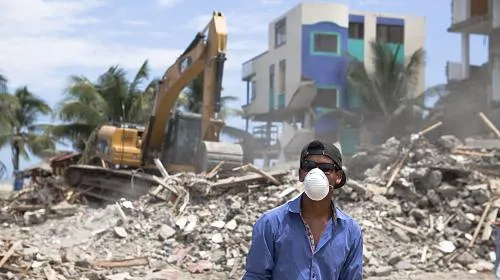QUITO—(April 29, 2016)– After a massive earthquake that rocked Ecuador on April 16, more than 720,000 people are in need of immediate assistance. Over 700 aftershocks and a death toll rising to 659 have left people in fear.
More than 29,000 people have been left homeless and are sleeping outdoors alongside roads outside of their hometowns with little or no protection from the elements. With no access to clean drinking water and sanitation facilities there is a high risk of diseases such as Zika Virus or Dengue Fever. Many are sharing space under makeshift tents, which increases the risk of violence towards women and girls.
According to the Government of Ecuador, about 2,000 homes were damaged and destroyed. People are in need of durable emergency shelter that can protect them while they start to recover. Heavy destruction is almost exclusively seen in urban centers making it more difficult to build back safer in the future.
“In rural areas it is relatively easier to support people on the self-reconstruction process because people build their houses with material like wood and bamboo which is safer in earthquakes,“ said Bill Flinn CARE Shelter Expert currently in Ecuador. “In urban centers where buildings are made out of concrete by contracted builders, it is harder to assure safer standards. Concrete is extremely dangerous in an earthquake. Earthquakes don’t kill people, it is buildings which do.”
This week, CARE distributed 500 mattresses and mosquito nets, as well as hygiene kits that include items like mosquito-repellent, soap and wet wipes for people who have to sleep on the bare ground in makeshift tents. Over the coming weeks, CARE plans to reach 5,400 people with emergency shelter packages including household rubble removal kits, tarpaulins and kitchen sets to help protect people from diseases and to support them as they begin to clear their homes out of debris and rebuild. For some families, CARE will provide livelihood support to help accelerate their own rebuilding process. As people are still living in fear because of the disaster and aftershocks, CARE will also provide psychosocial support to help children and adults to overcome trauma.

